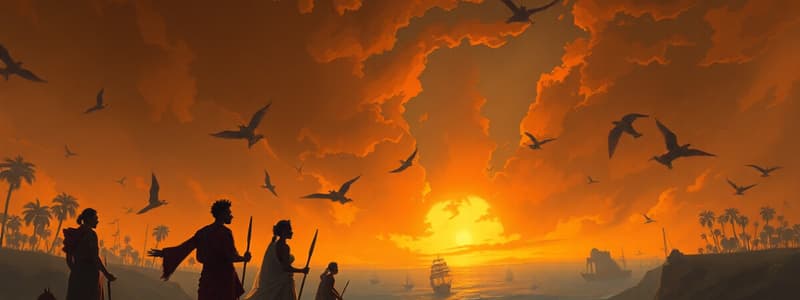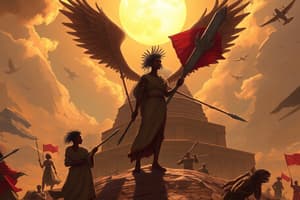Podcast
Questions and Answers
What was the main reason European powers began to colonize territories around the world in the late 1800s?
What was the main reason European powers began to colonize territories around the world in the late 1800s?
The search for low-cost raw materials.
What are the three types of territories European countries founded?
What are the three types of territories European countries founded?
Colonies, protectorates, and spheres of influence.
Which of the following countries used indirect rule to control their colonies?
Which of the following countries used indirect rule to control their colonies?
- France
- United Kingdom (correct)
European countries justified their imperial actions by believing that Western culture and way of life was superior to that of colonized people.
European countries justified their imperial actions by believing that Western culture and way of life was superior to that of colonized people.
What were the two main ways that European countries used to justify imperialism?
What were the two main ways that European countries used to justify imperialism?
Which of the following is NOT a region where Western nations gained power and influence through military force and trade agreements?
Which of the following is NOT a region where Western nations gained power and influence through military force and trade agreements?
What were the main natural resources that attracted European powers to Africa in the late 1800s?
What were the main natural resources that attracted European powers to Africa in the late 1800s?
The ______ Conference of 1884 clarified how European powers could claim African territory and divided the continent among them.
The ______ Conference of 1884 clarified how European powers could claim African territory and divided the continent among them.
African nations were invited to participate in the Berlin Conference and had a say in the division of their land among European powers.
African nations were invited to participate in the Berlin Conference and had a say in the division of their land among European powers.
Which of the following correctly describes the role of African nations in the face of European imperialism?
Which of the following correctly describes the role of African nations in the face of European imperialism?
Which two African nations were able to retain their independence during the colonial era?
Which two African nations were able to retain their independence during the colonial era?
European powers took advantage of the decline of which empire to expand their influence in the Middle East?
European powers took advantage of the decline of which empire to expand their influence in the Middle East?
What was a key infrastructure project that European powers constructed in the Middle East?
What was a key infrastructure project that European powers constructed in the Middle East?
The colonization of the Middle East led to a harmonious integration of different religious groups and an absence of conflict.
The colonization of the Middle East led to a harmonious integration of different religious groups and an absence of conflict.
What were the main reasons for European powers to colonize the Pacific Islands?
What were the main reasons for European powers to colonize the Pacific Islands?
What was the name of the rebellion in India that resulted in British rule taking control of India?
What was the name of the rebellion in India that resulted in British rule taking control of India?
What was the Chinese rebellion that opposed European imperialism and encouraged Chinese nationalism?
What was the Chinese rebellion that opposed European imperialism and encouraged Chinese nationalism?
The British East India Company's trading of opium to China led to a peaceful and harmonious relationship between the two nations.
The British East India Company's trading of opium to China led to a peaceful and harmonious relationship between the two nations.
The exposure to Western technologies, infrastructure, and ideas had a negative impact on colonized societies.
The exposure to Western technologies, infrastructure, and ideas had a negative impact on colonized societies.
What was the primary result of European colonization on colonized societies?
What was the primary result of European colonization on colonized societies?
The Monroe Doctrine declared that European powers should not expand further into Latin America.
The Monroe Doctrine declared that European powers should not expand further into Latin America.
The United States was able to enforce the Monroe Doctrine immediately upon its declaration in 1823.
The United States was able to enforce the Monroe Doctrine immediately upon its declaration in 1823.
The ______ War, inspired by growing nationalism in the United States, led to the Treaty of Paris, which put an end to Spanish rule in several Latin American territories.
The ______ War, inspired by growing nationalism in the United States, led to the Treaty of Paris, which put an end to Spanish rule in several Latin American territories.
Which of the following territories did the United States gain control over as a result of the Treaty of Paris?
Which of the following territories did the United States gain control over as a result of the Treaty of Paris?
The Roosevelt Corollary established that the United States had the right to intervene in the affairs of Latin American countries.
The Roosevelt Corollary established that the United States had the right to intervene in the affairs of Latin American countries.
What significant infrastructure project in Latin America established the United States as a major global power?
What significant infrastructure project in Latin America established the United States as a major global power?
Flashcards
Imperialism
Imperialism
The policy of extending a country's power and influence through diplomacy or military force, often by acquiring colonies.
Modernization
Modernization
The process of adopting new technologies, ideas, and ways of life, often associated with industrialization and Westernization.
Raw Materials
Raw Materials
Basic materials used to produce manufactured goods, such as iron ore, coal, and rubber.
Colonies
Colonies
Signup and view all the flashcards
Protectorates
Protectorates
Signup and view all the flashcards
Spheres of Influence
Spheres of Influence
Signup and view all the flashcards
Direct Rule
Direct Rule
Signup and view all the flashcards
Indirect Rule
Indirect Rule
Signup and view all the flashcards
Nationalism
Nationalism
Signup and view all the flashcards
Social Darwinism
Social Darwinism
Signup and view all the flashcards
Missionaries
Missionaries
Signup and view all the flashcards
Industrial Revolution
Industrial Revolution
Signup and view all the flashcards
Berlin Conference
Berlin Conference
Signup and view all the flashcards
Congo River Basin
Congo River Basin
Signup and view all the flashcards
Sepoy Rebellion
Sepoy Rebellion
Signup and view all the flashcards
Opium Wars
Opium Wars
Signup and view all the flashcards
Boxer Rebellion
Boxer Rebellion
Signup and view all the flashcards
Monroe Doctrine
Monroe Doctrine
Signup and view all the flashcards
Roosevelt Corollary
Roosevelt Corollary
Signup and view all the flashcards
Treaty of Paris
Treaty of Paris
Signup and view all the flashcards
Panama Canal
Panama Canal
Signup and view all the flashcards
Indian Nationalism
Indian Nationalism
Signup and view all the flashcards
Chinese Nationalism
Chinese Nationalism
Signup and view all the flashcards
Trade Routes
Trade Routes
Signup and view all the flashcards
Economic Dependence
Economic Dependence
Signup and view all the flashcards
Foreign Investment
Foreign Investment
Signup and view all the flashcards
Global Power
Global Power
Signup and view all the flashcards
Study Notes
European Expansion
- Imperialism modernized many parts of the world, establishing Western nations as powers.
- European powers sought low-cost raw materials, leading to colonization.
- Colonies provided living space for a growing European population.
- European territories included colonies, protectorates, and spheres of influence.
- Direct rule (France) and indirect rule (United Kingdom) were used to control colonies.
- Nationalism and Social Darwinism justified actions, claiming Western superiority.
- Missionaries spread Western religions and culture.
- Industrial Revolution created a need for raw materials, impacting global relations.
Imperialism in Africa and the Middle East
- Africa's resources (gold, diamonds, platinum) attracted European powers.
- The Berlin Conference of 1884 determined how European powers could claim African land, without African input.
- Africans resisted European imperialism, and some nations (Ethiopia, Liberia) maintained independence.
- Ottoman Empire's decline allowed European expansion in the Middle East.
- The Suez Canal and other infrastructure were brought in.
- Colonization led to conflict among Christians and Muslims.
Imperialism in India, China, and Pacific Islands
- Britain's relationship with India shifted from trade to conquest by 1800.
- Reforms challenged Hindu traditions, leading to resentment.
- The Sepoy Rebellion (1857) led to British direct control.
- Industrial Revolution impacted India introducing new technology and education.
- British actions sparked Indian nationalism.
- Trade disagreements (Opium Wars) led to treaties giving Britain trading rights in China.
- Boxer Rebellion opposed European influence.
- Pacific Islands were colonized for resources and strategic locations.
Imperialism in Latin America
- USA established the Monroe Doctrine to restrict European expansion.
- Latin America exported raw goods, imported finished goods, money, and technical knowledge, developing dependence on foreign imports.
- Large foreign investments and outside interventions impacted local politics.
- Spanish-American War granted the US territories (Philippines, Guam, Puerto Rico, and Cuba).
- The Roosevelt Corollary asserted US power in Latin America.
- US participation in the Panama Canal project asserted global power.
Studying That Suits You
Use AI to generate personalized quizzes and flashcards to suit your learning preferences.




